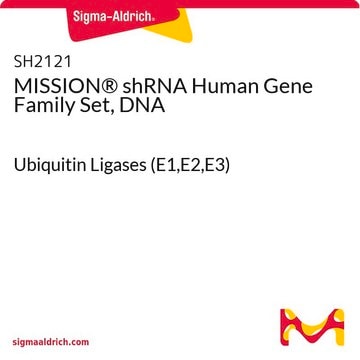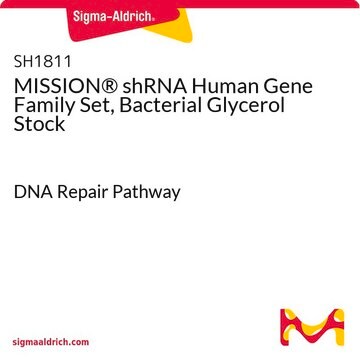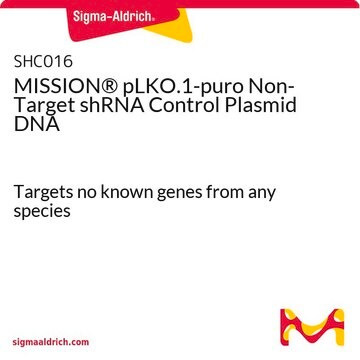SH2111
MISSION® shRNA Human Gene Family Set, Bacterial Glycerol Stock
Ubiquitin Ligases (E1,E2,E3)
Sign Into View Organizational & Contract Pricing
All Photos(1)
About This Item
UNSPSC Code:
41106609
NACRES:
NA.51
Recommended Products
product line
MISSION®
storage temp.
−70°C
Gene Information
Looking for similar products? Visit Product Comparison Guide
General description
The clones are sequenced-verified shRNA lentiviral plasmids (pLKO.1-puro) provided as 50 μl bacterial glycerol stocks (Terrific Broth, carbenicillin at 100 μg/ml and 15% glycerol). The set comes in 96-well plates that are barcoded for simple identification. A CD containing RefSeq, gene description, gene symbol, clone ID, hairpin sequence, locus link, and plate map positions are provided with the gene family set.
Other Notes
Each MISSION shRNA clone is constructed within the lentivirus plasmid vector, pLKO.1-Puro, followed by transformation into Escherichia coli. The pLKO.1-Puro vector contains bacterial (ampicillin) and mammalian (puromycin) antibiotic resistance genes for selection of inserts in either bacterial or mammalian cell lines. Each clone set consists of an average of 3-5 constructs that have been designed against each target gene using a proprietary algorithm. Therefore, a range of knockdown efficiency, with at least one construct from each gene set being >70%, can be expected when using these clones. This allows one to examine the effect of loss of gene function over a large series of gene knockdown efficiencies. Each shRNA construct has been cloned and sequence verified to ensure a match to the target gene.
For a detailed listing of other available gene family sets, visit the gene family set website.
Number of Genes: 341, Number of Clones: 2081
The exact gene and clone count at time of purchase may vary slightly as the TRC library is continually updated.
Legal Information
Use of this product is subject to one or more license agreements. For details, please see http://sigmaaldrich.com/missionlicense .
MISSION is a registered trademark of Merck KGaA, Darmstadt, Germany
recommended
Product No.
Description
Pricing
Certificates of Analysis (COA)
Search for Certificates of Analysis (COA) by entering the products Lot/Batch Number. Lot and Batch Numbers can be found on a product’s label following the words ‘Lot’ or ‘Batch’.
Already Own This Product?
Find documentation for the products that you have recently purchased in the Document Library.
Kim Newton et al.
Cancer investigation, 25(6), 502-513 (2007-09-21)
The regulated degradation of cellular proteins by the ubiquitin-proteasome system impacts a range of vital cellular processes in both normal and cancerous cells. An ubiquitin-activating enzyme (E1), ubiquitin-conjugating enzyme (E2), and ubiquitin ligase (E3) catalyzes the conjugation of the protein
Timothy Cardozo et al.
BMC biochemistry, 8 Suppl 1, S9-S9 (2007-12-06)
Recently, the ubiquitin proteasome system (UPS) has matured as a drug discovery arena, largely on the strength of the proven clinical activity of the proteasome inhibitor Velcade in multiple myeloma. Ubiquitin ligases tag cellular proteins, such as oncogenes and tumor
Our team of scientists has experience in all areas of research including Life Science, Material Science, Chemical Synthesis, Chromatography, Analytical and many others.
Contact Technical Service






